Mouse Anti-CD62L Antibody Product Attributes
Species: Mouse
Tested Applications: Flow Cytometry.
Application Notes: See Product Datasheet for Recommended Dilution Range. Requires Experimental Optimization
Clonality: Monoclonal Antibody
Anti-CD62L Antibody Clone: MEL-14
Clone MEL-14 Host and Isotype: Rat IgG2a kappa
Buffer and Stabilizer: 10 mM NaH2PO4, 150 mM NaCl, 0.09% NaN3, pH7.2
Antibody Concentration: 0.5 mg/mL
Storage Conditions: 2-8C protected from light. Stable for 12 Months. Do Not Freeze.
CD62L Previously Observed Antibody Staining Patterns
Observed Antibody Staining Data By Tissue Type:
Variations in CD62L antibody staining intensity in immunohistochemistry on tissue sections are present across different anatomical locations. An intense signal was observed in lymphoid tissue in appendix, hematopoietic cells in the bone marrow, non-germinal center cells in the lymph node, cells in the white pulp in spleen, germinal center cells in the tonsil and non-germinal center cells in the tonsil. More moderate antibody staining intensity was present in lymphoid tissue in appendix, hematopoietic cells in the bone marrow, non-germinal center cells in the lymph node, cells in the white pulp in spleen, germinal center cells in the tonsil and non-germinal center cells in the tonsil. Low, but measureable presence of CD62L could be seen in. We were unable to detect CD62L in other tissues. Disease states, inflammation, and other physiological changes can have a substantial impact on antibody staining patterns. These measurements were all taken in tissues deemed normal or from patients without known disease.Observed Antibody Staining Data By Tissue Disease Status:
Tissues from cancer patients, for instance, have their own distinct pattern of CD62L expression as measured by anti-CD62L antibody immunohistochemical staining. The average level of expression by tumor is summarized in the table below. The variability row represents patient to patient variability in IHC staining.| Sample Type | breast cancer | carcinoid | cervical cancer | colorectal cancer | endometrial cancer | glioma | head and neck cancer | liver cancer | lung cancer | lymphoma | melanoma | ovarian cancer | pancreatic cancer | prostate cancer | renal cancer | skin cancer | stomach cancer | testicular cancer | thyroid cancer | urothelial cancer |
|---|---|---|---|---|---|---|---|---|---|---|---|---|---|---|---|---|---|---|---|---|
| Signal Intensity | + | - | + | + | + | - | + | + | - | ++ | - | + | + | + | - | - | - | + | + | + |
| SELL Variability | ++ | ++ | ++ | ++ | ++ | ++ | ++ | + | ++ | ++ | + | + | ++ | + | ++ | ++ | ++ | + | ++ | ++ |
Selected References
Lee L-F, Logronio K, Tu GH, Zhai W, Ni I, Mei L, Dilley J, Yu J, et al. 2012. Proc. Natl. Acad. Sci. 10.1073. (Flow cytometry).Harp JR, Gilchrist MA, and Onami TM. 2010. J. Immunol. 185:5751-5761. (in vivo blocking)Furukawa Y, Umemoto E, Jang MH, Tohya K, Miyasaka M, and Hirata T. 2008. J. Biol. Chem. 283: 12112-12119. (Immunoelectron microscopy)Li Y, Brazzell J, Herrera A, and Walcheck B. 2006. 108: 2275-2279. (Immunoprecipitation)Ochando JC, Yopp AC, Yng Y, Garin A, Li Y, Boros P, Llodra J, Ding Y, Lira SA, Krieger NR, and Bromberg JS. 2005. J. Immunol. 174: 6993-7005. (in vivo blocking, Flow cytometry)Zhao L-C, Shey M, Farnsworth M, and Dailey MO. 2001. J. Biol. Chem. 276: 30631-30640. (Immunoprecipitation)Suzuki A, Andrew DP, Gonzalo JA, Fukumoto M, Spellberg J, Hashiyama M, Takimoto H, Gerwin N, Webb I, Molineux G, Amakawa R, Tada Y, Wakeham A, Brown J, McNiece I, Ley K, Butcher EC, Suda T, Gutierrez-Ramos JC, and Mak TK. 1996. Blood. 87:3550-3562. (Stamper-Woodruff assay; in vivo blocking)Reichert RA, Jerabek L, Gallatin WM, Butcher EC, and Weissman IL. 1986. 136(10): 3535-3542. (Immunohistochemistry)
Limitations and Warranty
enQuire Bio's Mouse Anti-CD62L / L-Selectin Monoclonal is available for Research Use Only. This antibody is guaranteed to work for a period of two years when properly stored.
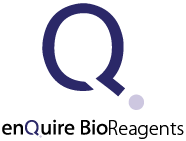
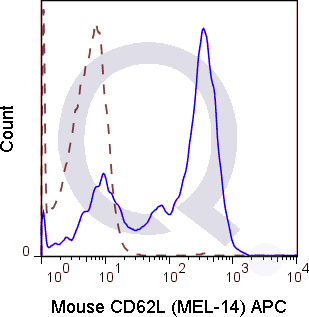

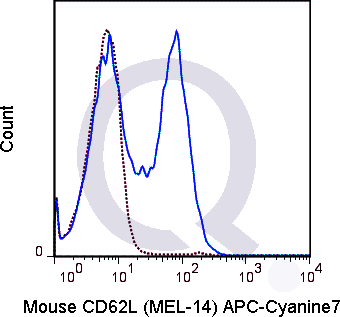
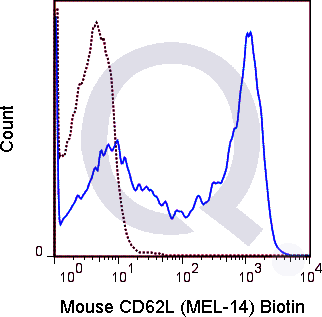
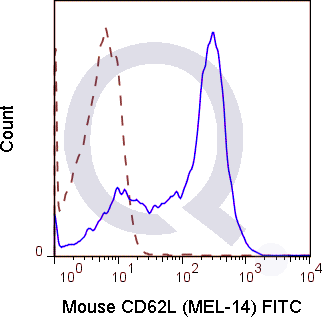
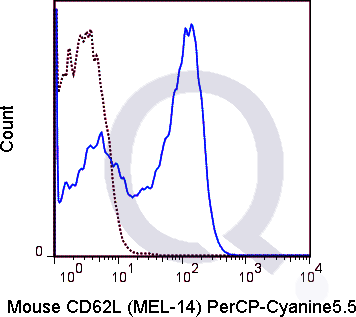
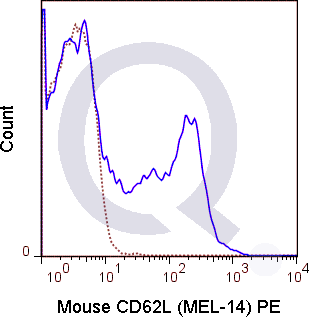
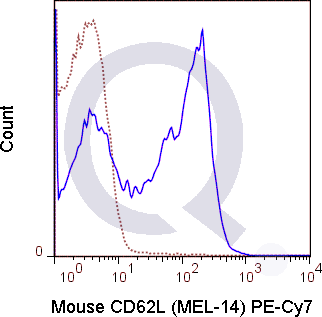
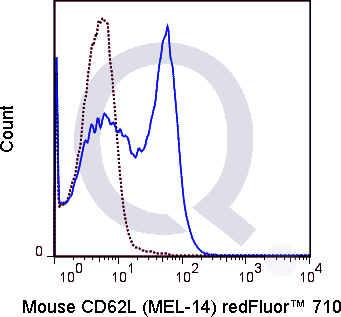
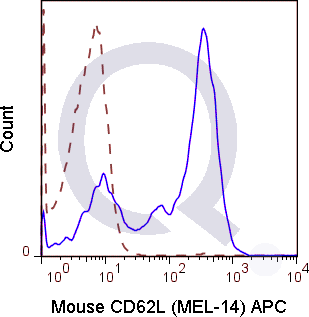
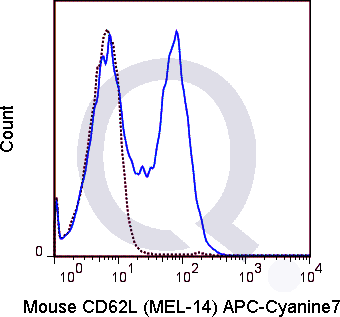
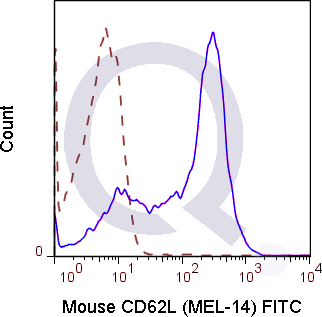
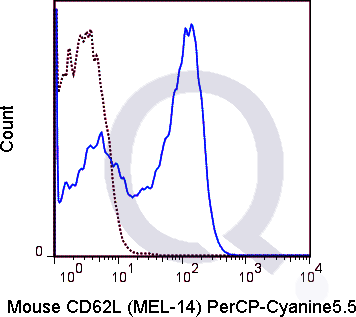
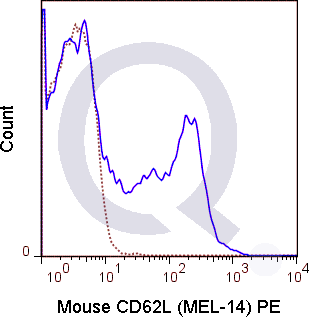
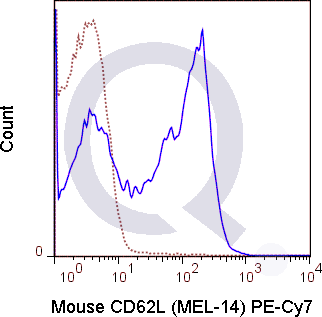
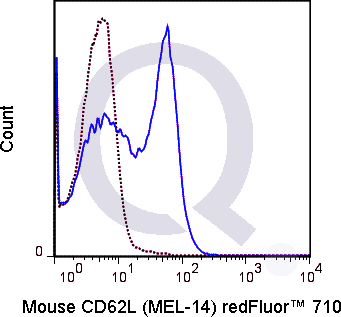

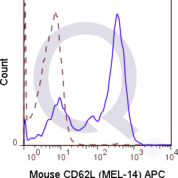
There are no reviews yet.